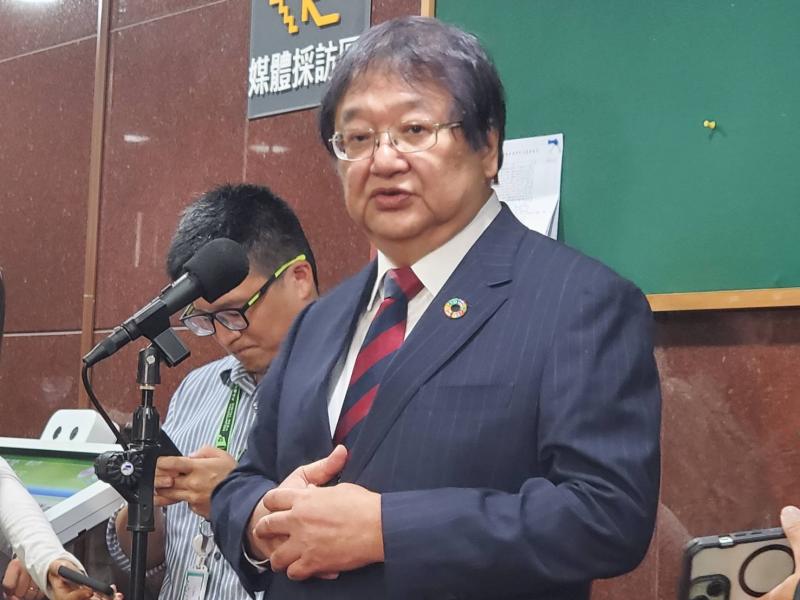National Health Insurance (NHI) premiums are not likely to rise next year, Minister of Health and Welfare Chiu Tai-yuan (邱泰源) said, after an announcement that the agency's draft budget for next year could increase by up to 5.5 percent annually.
As a top-end increase would leave the reserve fund insufficient to fill the gap in funding, fears have grown that NHI premiums would rise.
The baseline budget for next year for the NHI is projected to be NT$936.81 billion (US$31.3 billion), the Ministry of Health and Welfare said.

Photo: Lin Hui-chin, Taipei Times
At the low end of the range of estimated growth, or a 2.942 percent rise, the budget would increase by NT$27.6 billion to NT$964.41 billion, with reserve funds enough for 1.31 months of expenditure, the ministry said.
At the high end of the estimate, or 5.5 percent, the budget would increase by NT$51.5 billion to NT$988.31 billion, with the reserve covering 0.96 months, it said.
The National Health Insurance Act (全民健康保險法) stipulates that the NHI reserve fund must cover at least one month of expenses.
The ministry is still uncertain whether additional funding would be required, as the budget is subject to variables and NHI finances remain in flux, Chiu said.
However, premium rates are not expected to rise, he added.
Experts from the medical industry recommend adopting the higher estimate to maintain financial resilience at hospitals and gradually raising premiums when necessary.
The government should also consider allocating NT$3 billion from the general budget to fill the gap, they said.
Next year's budget should be 5.5 percent larger to maintain the NHI system, said Taiwan College of Healthcare Executives director Hung Tzu-jen (洪子仁), who is vice superintendent of Shin Kong Hospital.
Setting individual budgets means that each hospital has to have the financial resilience to avoid the risk of reduced clinic hours or increased registration fees, while they have to have the long-term capacity to swiftly introduce new drugs and technology added to NHI coverage, Hung said.
The medical community says that premiums must be adjusted when necessary to sustain the NHI system and uphold the spirit of universal health coverage according to the reason it was designed 30 years ago, ie, to uphold individual responsibility and provide mutual aid, he said.
Additional reporting by Lin Hui-chin

The manufacture of the remaining 28 M1A2T Abrams tanks Taiwan purchased from the US has recently been completed, and they are expected to be delivered within the next one to two months, a source said yesterday. The Ministry of National Defense is arranging cargo ships to transport the tanks to Taiwan as soon as possible, said the source, who is familiar with the matter. The estimated arrival time ranges from late this month to early next month, the source said. The 28 Abrams tanks make up the third and final batch of a total of 108 tanks, valued at about NT$40.5 billion

Two Taiwanese prosecutors were questioned by Chinese security personnel at their hotel during a trip to China’s Henan Province this month, the Mainland Affairs Council (MAC) said yesterday. The officers had personal information on the prosecutors, including “when they were assigned to their posts, their work locations and job titles,” MAC Deputy Minister and spokesman Liang Wen-chieh (梁文傑) said. On top of asking about their agencies and positions, the officers also questioned the prosecutors about the Cross-Strait Joint Crime-Fighting and Judicial Mutual Assistance Agreement, a pact that serves as the framework for Taiwan-China cooperation on combating crime and providing judicial assistance, Liang

A group from the Taiwanese Designers in Australia association yesterday represented Taiwan at the Midsumma Pride March in Melbourne. The march, held in the St. Kilda suburb, is the city’s largest LGBTQIA+ parade and the flagship event of the annual Midsumma Festival. It attracted more than 45,000 spectators who supported the 400 groups and 10,000 marchers that participated this year, the association said. Taiwanese Designers said they organized a team to march for Taiwan this year, joining politicians, government agencies, professionals and community organizations in showing support for LGBTQIA+ people and diverse communities. As the first country in Asia to legalize same-sex

MOTIVES QUESTIONED The PLA considers Xi’s policies toward Taiwan to be driven by personal considerations rather than military assessment, the Epoch Times reports Chinese President Xi Jinping’s (習近平) latest purge of the Chinese People’s Liberation Army (PLA) leadership might have been prompted by the military’s opposition to plans of invading Taiwan, the Epoch Times said. The Chinese military opposes waging war against Taiwan by a large consensus, putting it at odds with Xi’s vision, the Falun Gong-affiliated daily said in a report on Thursday, citing anonymous sources with insight into the PLA’s inner workings. The opposition is not the opinion of a few generals, but a widely shared view among the PLA cadre, the Epoch Times cited them as saying. “Chinese forces know full well that